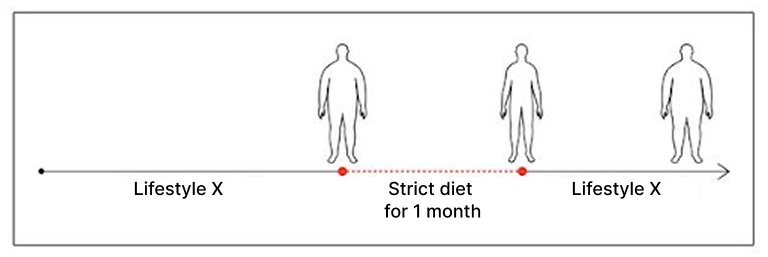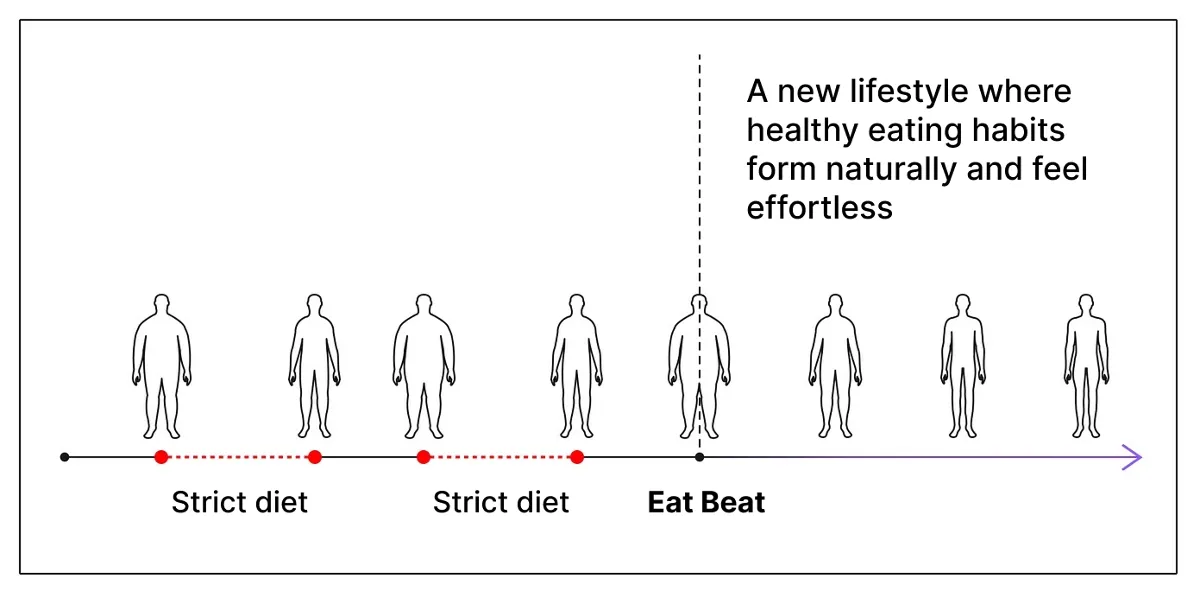
Written by Elizabeth V., product owner in Eat Beat app
Editing by Olivia G., editor in Eat Beat app
What You’ll Learn
Sustainable weight loss isn’t about surviving a diet; it’s about creating a lifestyle you enjoy and can maintain. Fad diets that promise quick results often end in disappointment. By focusing on habits—eating more whole foods, making small tweaks, staying active, sleeping well and staying patient—you’ll build a healthier you one step at a time.
Table of contents
- 1 The Pitfall of Focusing Only on Weight Loss and Diets
- 2 Habits vs. Results: How Eating Habits and Motivation Build Long‑Term Weight Loss Success
- 3 How to Change Your Lifestyle and Eating Habits for Long‑Term Weight Loss
- 4 Slip‑Ups and Motivation: Staying Motivated for Long‑Term Weight Maintenance
- 5 Discover How Eat Beat App Helps You to Lose Weight Forever
- 6 Sources
It’s easy to think that the problem with dieting is how to lose weight. In reality, the tougher challenge is keeping the weight off. A meta‑analysis of long‑term weight‑loss studies found that more than half of the lost weight was regained within two years, and by five years more than 80 % was regained.
This sobering statistic illustrates a key point: rapid, restrictive diets can deliver short‑term results, but they rarely lead to lasting change. Your weight is the product of your daily routines, often built over decades. To achieve sustainable weight loss, you have to change your habits—not just your meals.
The Pitfall of Focusing Only on Weight Loss and Diets
Many people treat dieting like a temporary project: endure a spartan eating plan, watch the numbers on the scale drop, then return to “normal.” That’s why so many diets fail. Rapid weight loss often triggers a yo‑yo cycle: weight regain frequently starts within the first year after dieting, and the pre‑intervention weight is reached or even surpassed within two to five years (PMC). The core problem isn’t losing weight; it’s that most restrictive diets don’t teach you how to live differently.

For Example
This is Lucy. She’s a busy mom with a desk job, a husband and kids, and little time for exercise. In her twenties Lucy was slim, but over the years she gained weight without really noticing. She has tried everything—cutting out sweets, eating 1 200 calories per day, going keto, intermittent fasting.
Each time she lost 11–15 lb in a couple months, but as soon as she resumed her old habits the pounds returned and the number on the scale crept even higher. The pattern repeated because her dieting mindset was temporary: “once I see a number I like, I can eat like before.”
This pattern illustrates an important truth: weight regain is a natural consequence of reverting to the lifestyle that caused weight gain in the first place. Lasting change requires a new way of living.
Habits vs. Results: How Eating Habits and Motivation Build Long‑Term Weight Loss Success
Another obstacle to sustainable weight loss is an obsession with the outcome. Weight loss isn’t a sprint—it’s a journey. When progress is measured only by the number on the scale, even normal fluctuations can feel like failure.
Lucy joined a coaching program. She downloaded a calorie‑tracking app, bought kitchen scales, joined a gym and began weighing herself every day. She aimed for a daily deficit of 1 300 calories, which left her hungry and tired. The scale bounced around: –0.66 lb, +1.1 lb, –2.2 lb, +4.4 lb. After a month Lucy felt exhausted and discouraged. To her it seemed pointless: she was starving and sweating in the gym, yet the scale barely moved.
Lucy’s disappointment was predictable. When the result is distant and the path is long, watching daily numbers reinforce the feeling of “not there yet.”
The solution is to focus on the process. Instead of obsessing over “lose 20 lb,” set goals you can control: have oatmeal for dinner, use 1 % milk instead of cream, start every meal with a salad, etc. Celebrate each healthy choice; small victories compound over time.
Behavioral research backs this approach. People who successfully maintain long‑term weight loss share common patterns: they limit calorie‑dense foods and sugar‑sweetened beverages, maintain a consistent eating pattern, increase fruit and vegetable consumption and stay physically active for at least an hour a day (Health Harvard). They also monitor their weight periodically—not to obsess over daily fluctuations, but to stay aware and adjust as needed.

How to Change Your Lifestyle and Eating Habits for Long‑Term Weight Loss
Lasting weight loss isn’t about willpower or deprivation. It’s about cultivating habits that support a healthier you. Here are four guiding principles to make that happen.
1. Focus on Healthy Habits and Process, Not the Scale
Shift your mindset from “I need to lose 30 lb” to “I will eat vegetables every day.” When you meet that daily goal, give yourself credit. Over time, those small actions build momentum and lead to results.
2. Use the 90/10 Rule to Build New Eating Habits
New habits stick best when they piggyback onto existing routines. Keep 90 % of what you normally do and tweak just 10 %. For example, if you love sandwiches, keep eating them—just add a leaf of lettuce or a slice of tomato. Eat oatmeal for breakfast? Add a handful of berries and pumpkin seeds. Small upgrades are easier to maintain than wholesale overhauls.
3. Flexible Dieting: Replace Foods, Don’t Eliminate
Total deprivation breeds cravings and rebound binges. Instead, swap less nutritious foods for healthier alternatives. Craving sweets? Have fruit, berries or a square of dark chocolate. Love soda? Try sparkling water with lemon or sugar‑free beverages. Enjoy baked goods? Make treats with oats, cottage cheese and natural sweeteners. By substituting rather than forbidding, you avoid feeling deprived and make healthy eating sustainable.
4. Balanced Nutrition, Don’t Starve
Calorie deficits matter, but quality of calories matters just as much. A 1 000‑calorie intake can be two slices of cake or a balanced meal with steak, potatoes, salad, coffee and a cookie. Which option keeps you full longer? Prioritize protein and fiber—lean meats, fish, eggs, dairy, beans, vegetables, whole grains, seeds and nuts. Aim for 80 % of your diet from nourishing foods and 20 % from small indulgences. This flexible approach allows satisfaction without excess.
5. Physical Activity: Walk, Count Steps and Exercise Regularly
Daily movement helps burn calories and improves metabolic health. The Centers for Disease Control and Prevention recommend that adults accumulate at least 150 minutes of moderate‑intensity activity per week—about 30 minutes a day, five days a week—and engage in muscle‑strengthening activities on two or more days. You can meet this target by walking briskly, climbing stairs, dancing or cycling. Regular strength training with body weight, dumbbells or gym equipment preserves muscle mass and boosts your resting calorie burn; choose activities you enjoy and progress gradually.
6. Prioritize Sleep and Recovery for Long‑Term Weight Loss
Sleep isn’t just rest—it regulates hormones that control appetite. Most healthy adults need at least seven hours of sleep per night, and sleeping less than that has been linked to weight gain, obesity and other health problems. Sleep deprivation alters the neuroendocrine appetite‑control system by reducing leptin (a satiety hormone) and increasing ghrelin (a hunger hormone). Aim for consistent bed and wake times, limit evening screen time and create a calm sleep environment to help you meet this sleep target. Adequate rest curbs cravings and keeps you energized for healthier choices.
Slip‑Ups and Motivation: Staying Motivated for Long‑Term Weight Maintenance
Perfection isn’t required. Skip a workout? It’s fine. Enjoy a dessert? No problem. Occasional indulgences won’t sabotage your progress; consistency matters more than isolated lapses. When your actions match your intentions—exercise regularly, eat thoughtfully and rest well—you’ll build confidence and momentum.
I no longer want to lose weight. I want to be healthy and feel better. It’s amazing how a mindset shift changes everything!I’ve learned to go to the gym, but now it’s no longer a punishment for gaining weight — it’s an act of self-care.
Sure, I don’t love working out, but I do love that feeling of lightness afterward. I’m slowly getting used to eating more vegetables, nuts, and seeds. I’ve started eating more eggs and even developed a love for lentils.
And you know what? I don’t even crave cake or chips anymore — I’m simply satisfied. At some point, I realized I was finally ready to step on the scale.
And guess what? For the first time in forever, the number started with a 1! Yes, I’m only at the beginning of this journey — but now I’m walking it with joy and confidence.
— Lucy
Finally, remember why you started. External rewards or pressure rarely drive lasting change. Research suggests that feeling autonomous and internally motivated to exercise and eat well is associated with greater weight‑loss success, while external or rigid control is not. Align your choices with your values—whether that means feeling better, being stronger or setting a healthy example for your children—and the journey becomes meaningful in itself.
Discover How Eat Beat App Helps You to Lose Weight Forever
If you’re looking for support, Eat Beat can help you lose weight without giving up your favorite foods. Our program is designed to foster healthy eating habits that fit your life, making weight loss a natural byproduct of a balanced lifestyle.




